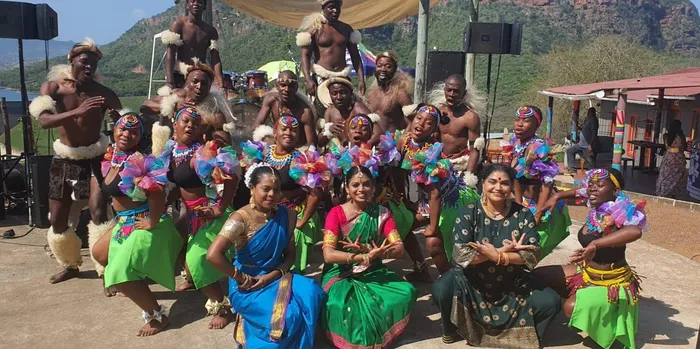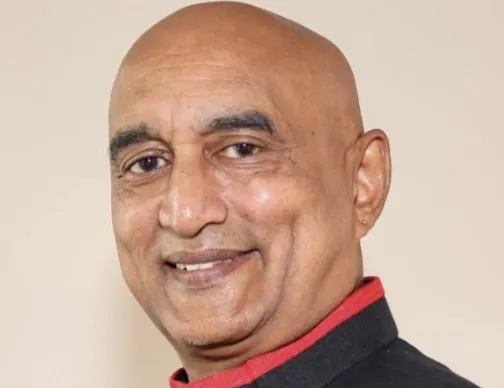
Pranessa Pillay, front from left, Kayuri Solai and Nirmala Govender with Zulu dancers from the Wushwini Arts Centre in Kwa Ngcolosi
Image: Supplied
THIS September marks a profound milestone in our nation’s story: 165 years since the arrival of the first indentured Indian labourers on the shores of Durban in 1860. They came with little more than determination and hope, carrying seeds of culture, faith, language, and tradition across the ocean.
Today, more than a century and a half later, those seeds have blossomed into a vibrant Indian heritage firmly rooted in South African soil. Heritage Month gives us the chance to reflect on this journey - not as a nostalgic indulgence, but as an affirmation of how heritage shapes identity, strengthens unity, and builds bridges across cultures. It is worth remembering that heritage is not about monuments of the past, but movements for the future.
Our forebears toiled under harsh and exploitative conditions on the sugar cane fields of Natal. Yet, even amidst hardship, they nurtured their languages, their foods, their music, and their spiritual practices. From the sound of temple bells to the aroma of curry wafting from kitchen fires, from the verses of devotional songs to the joy of colourful festivals, they created cultural spaces that gave meaning to their new lives.
Those who followed - merchants, teachers, professionals, activists - deepened these roots. They built schools, mosques, temples, churches and community halls. They fought against discrimination and for dignity. And they planted the seeds of resilience, creativity, and solidarity that we continue to benefit from today.
To borrow from Rabindranath Tagore: “Faith is the bird that feels the light and sings when the dawn is still dark.”
Our pioneers sang that song in the dark days of indenture and apartheid, leaving us with a dawn filled with possibility. Over the decades, countless individuals and organisations have carried this torch forward. Cultural bodies, temples, churches, mosques, linguistic associations, and ordinary families have kept alive the languages of Tamil, Telugu, Hindi, Gujarati, and Urdu. Artists have preserved the classical and folk traditions of dance and music. Writers and journalists have chronicled the stories of our communities.
These are not small acts - they are the beating heart of heritage preservation. Each initiative, whether it be a youth cultural festival, a community radio broadcast, or a language class at a local school, is a thread in the rich tapestry of Indian heritage in South Africa. We owe a debt of gratitude to all who have nurtured these traditions, often quietly and with little recognition. But the challenge before us is clear: their dreams and aspirations must not be in vain.
Heritage is not something to be admired from a distance like a museum piece. It must be lived, practiced, and shared. Yet, as South Africans of Indian origin, we must also be mindful that our identity is not one-dimensional. While we proudly celebrate our Indian heritage, we are first and foremost South Africans. Our story is interwoven with that of Zulu, Xhosa, Afrikaans, Sotho, Tswana, and many others.
The great Nelson Mandela reminded us: “Our rich and varied cultural heritage has a profound power to help build our nation.”
This is the challenge and the opportunity before us: to celebrate what makes us unique, while embracing what binds us together. Sharing our culture with others - whether through cuisine, dress, dance, or story - is not about holding on tightly to difference, but about opening doors to understanding. In turn, learning about the traditions of our fellow South Africans enriches us, creating a cycle of respect and cohesion.
Heritage Day on September 24 should not be trivialised into “National Braai Day,” a commercial idea that risks reducing a profound national celebration to smoke and boerewors. Braais may indeed bring people together, but true heritage lies deeper. Heritage Day is about affirming identity, recognising history, and building bridges across cultures. It is a day for reflection and renewal - a day when the many strands of South Africa’s cultural mosaic come together in unity.
How then do we make Heritage Month truly meaningful?
The answer lies in creating opportunities to learn from one another in everyday spaces. In our schools, pupils could be encouraged to wear traditional attire, share songs, dances, and foods from their cultures, and tell the stories of their heritage. Such activities would not only instil pride in one’s own identity but also foster curiosity and respect for others. In the workplace, the corporate sector could dedicate a day for employees to showcase their diverse cultural roots. Imagine colleagues sampling each other’s favourite traditional dishes, explaining the significance of rituals, or displaying crafts that connect them to their ancestry. This would turn the workplace into a platform for unity through shared experience.
Within our communities, cultural festivals, interfaith gatherings, and exhibitions can create safe and vibrant spaces where traditions are celebrated collectively. For young people especially, such events serve as powerful reminders that their heritage is not a relic of the past, but a living inheritance to be carried forward. Heritage is not a luxury; it is a foundation for nation-building.
When we respect and celebrate our differences, we create unity not in spite of diversity, but because of it. As South Africans of Indian origin, let us commit ourselves to passing on the songs, languages, and rituals of our ancestors. Let us also commit to listening to the songs, languages, and rituals of others. Only then can we live out the true spirit of Ubuntu - “I am because we are.”
This Heritage Month, as we mark 165 years since the first ship of indentured labourers docked in Natal, let us honour their legacy not only by remembering, but by reimagining. They sowed the seeds. It is up to us to nurture the garden - a garden that blooms with Indian heritage, rooted in South African soil, open to the sunlight of many cultures.

Dr Rajendran Govender
Image: File
Dr Rajendran Govender is a social anthropologist and researcher; Ford and IBSA Fellow; Commissioner in the Cultural, Religious and Linguistic Rights Commission; Board Member of the Pan South African Language Board (PanSALB); Global Coordinator of the Global Repository of Ancient Cultural Endeavours; and CEO of the Tamil Business Warriors. He writes in his personal capacity.
** The views expressed do not necessarily reflect the views of IOL or Independent Media.
Related Topics: